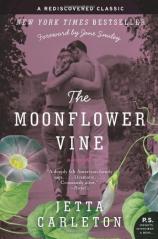Reading Group Guide
Discussion Questions
The Moonflower Vine

1. At the end of the novel's first section, The Moonflower Vine blooms – an event that is repeated, or described, a number of times in the pages that follow (when Matthew and Charlotte are alone, for example, and on the last page of the novel). What is the significance of the blooming moonflower vine? Do you think its significance is different for each character?
2. In an unsettling portion of the novel, Matthew's student Charlotte leaves town after the two share an intimate moment; a short time later, Matthew and Callie conceive their youngest daughter, Mathy. Describing this series of events, the narrator states, "Mathy was Charlotte's child" (p. 174). Discuss the meaning of that statement.
3. Throughout the novel, Matthew returns to the cemetery on the hill. What significance does the cemetery have in The Moonflower Vine and, more specifically, for Matthew?
4. After visiting Ed with his grandson Peter, Matthew comes to the realization that "fed or hungry, accepted or denied, [Ed] was his own man" (p. 233). What does it mean to be your own man in this novel? Why do you think Matthew envies Ed?
5. On page 205, Mathy reads Ezra Pound's poem "An Immorality" to Leonie. What is the significance of the first stanza --- "Sing we for love and idleness, / Naught else is worth the having" --- to the novel? Is "immorality" something that Carleton's characters believe in? Does the narrator believe in this philosophy?
6. In many ways, The Moonflower Vine is a novel about freedom. Of its major characters, who is the freest? What does this say about the author's conception of freedom?
7. What is Callie's great shame? Do you feel that this shame intensifies or weakens as the novel progresses? What do you make of the ending of the novel, when Callie ostensibly rids herself of shame?
8. At the novel's end, Callie spots a white heron and cries out, "O God... I love your world" (p. 318). What does the heron symbolize, and why does this bird have such an effect on her?
9. What role does God play in the lives of each character in the novel? How do their initial conceptions of God change as the characters develop?
10. While marriage clearly constricts a number of the characters in this novel, at other times it allows them to explore places they never expected to visit. How do you perceive Jetta Carleton's message about marriage in The Moonflower Vine?
The Moonflower Vine
- Publication Date: March 24, 2009
- Paperback: 318 pages
- Publisher: Harper Perennial
- ISBN-10: 0061673234
- ISBN-13: 9780061673238







